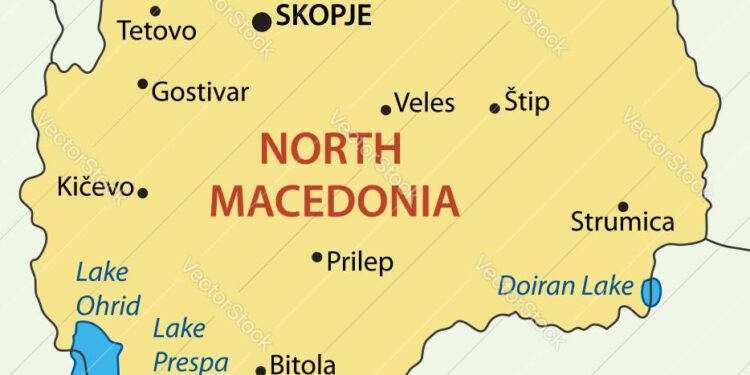The International Monetary Fund (IMF) has released a comprehensive report titled “Republic of North Macedonia: Selected Issues,” offering an in-depth analysis of the country’s economic landscape and policy challenges. As North Macedonia continues its path toward European integration and economic stabilization, the IMF’s findings shed light on critical sectors shaping the nation’s growth prospects. This article delves into the key insights presented in the report, highlighting the opportunities and risks that lie ahead for North Macedonia’s economy.
Republic of North Macedonia Faces Key Economic Challenges Amid Regional Pressures
The Republic of North Macedonia is navigating a complex economic landscape marked by sustained regional pressures and internal structural challenges. Inflationary trends and fluctuating foreign investment have placed considerable strain on fiscal policy, prompting the government to seek comprehensive reforms aimed at stabilizing growth. Key vulnerabilities include a reliance on external trade flows and remittances, which expose the economy to geopolitical shifts and global market uncertainties. Policymakers are prioritizing efforts to enhance domestic productivity while addressing labor market imbalances that hinder inclusive development.
Critical economic concerns currently under scrutiny include:
- Rising unemployment rates among youth and marginalized communities
- Limited diversification of the industrial base
- Pressure on public finances due to social protection expenditures
- Dependence on energy imports and infrastructure bottlenecks
| Indicator | 2023 | Projection 2024 |
|---|---|---|
| GDP Growth | 2.8% | 3.1% |
| Inflation Rate | 7.4% | 5.2% |
| Unemployment Rate | 16.1% | 15.3% |
| Fiscal Deficit (% of GDP) | 3.5% | 2.9% |
IMF Report Highlights Structural Reforms Needed for Sustainable Growth
The IMF’s latest analysis underscores the urgent need for deep-rooted structural reforms to ensure North Macedonia’s economic resilience and long-term prosperity. Key areas identified include enhancing the business climate, reforming public administration, and strengthening governance frameworks. These measures are essential to attract sustainable investment and promote productivity growth amid shifting global economic dynamics.
Specific recommendations focus on:
- Labor market flexibility: Introducing policies to reduce unemployment and improve workforce skills.
- Public sector efficiency: Streamlining government services and combating corruption to foster transparency.
- Financial sector development: Expanding access to credit for small and medium enterprises (SMEs) to boost entrepreneurship.
| Reform Area | Current Challenge | Recommended Action |
|---|---|---|
| Tax Policy | Complex system hindering compliance | Simplify tax code and improve collection |
| Judicial System | Backlogs and lack of independence | Enhance transparency and reduce delays |
| Infrastructure | Inadequate transport networks | Accelerate public-private partnerships |
Policy Recommendations Focus on Fiscal Discipline and Investment Climate Improvement
The fiscal strategy proposed underscores the necessity to strengthen budgetary discipline by implementing more stringent expenditure controls and optimizing revenue collection mechanisms. Authorities are encouraged to prioritize reducing public debt levels while maintaining essential social and infrastructure spending. This balanced approach aims to restore investor confidence and create a fiscal buffer capable of absorbing external shocks, thereby enhancing macroeconomic stability.
Improving the investment climate is equally pivotal, with recommendations emphasizing the simplification of regulatory frameworks and the enhancement of transparency. Key focus areas include:
- Streamlining business registration and licensing procedures
- Enhancing property rights enforcement and contract resolution
- Promoting public-private partnerships through clear legal frameworks
- Facilitating access to finance for small and medium enterprises
Such measures are expected to spur private sector growth and attract foreign direct investment, critical drivers for sustainable economic development.
| Policy Area | Primary Action | Expected Outcome |
|---|---|---|
| Fiscal Discipline | Expenditure rationalization & enhanced tax collection | Reduced deficit & lower debt risk |
| Regulatory Reform | Simplify licensing & registration | Improved ease of doing business |
| Contract Enforcement | Enhance property rights & dispute resolution | Increased investor confidence |
| Public-Private Partnerships | Establish clear legal frameworks | Boost infrastructure development |
| Access to Finance | Facilitate SME financing channels | Expanded private sector growth |
Let me know if you want me to help with anything else!
In Summary
In conclusion, the IMF’s assessment of the Republic of North Macedonia highlights both opportunities and challenges as the country navigates its economic future. While structural reforms and fiscal discipline remain pivotal, sustained efforts toward integration with regional and international markets are equally critical. As North Macedonia continues on its path of development, close collaboration with international partners will be essential to foster stability and inclusive growth. The forthcoming period will serve as a litmus test for the nation’s ability to translate policy recommendations into tangible progress for its citizens.
















